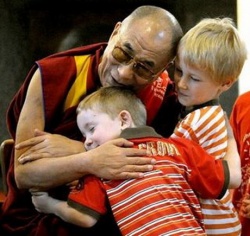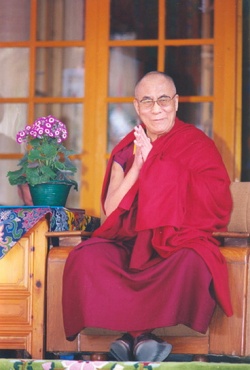Difference between revisions of "Dalai Lama Wins the Nobel Peace Prize"
| Line 14: | Line 14: | ||
[[Word]] of the selection reached the [[Dalai Lama]] in Newport Beach, Calif., where he was attending a conference to explore approaches to [[psychological]] well-being and [[spirituality]]. | [[Word]] of the selection reached the [[Dalai Lama]] in Newport Beach, Calif., where he was attending a conference to explore approaches to [[psychological]] well-being and [[spirituality]]. | ||
| − | ''I very much appreciate that kind of {{Wiki|recognition}} about my [[beliefs]],'' he said. ''In fact, I always believed in [[love]], [[compassion]] and a [[sense]] of [[universal]] [[respect]]. Every [[human being]] has that potential. My case is [[nothing special]]. I am a simple [[Buddhist monk]] - no more, no less.'' Interference Is Charged. | + | ''I very much appreciate that kind of {{Wiki|recognition}} about my [[beliefs]],'' he said. ''In fact, I always believed in [[love]], [[compassion]] and a [[sense]] of [[universal]] [[respect]]. |
| + | |||
| + | Every [[human being]] has that potential. | ||
| + | |||
| + | My case is [[nothing special]]. I am a simple [[Buddhist monk]] - no more, no less.'' Interference Is Charged. | ||
[[File:Dalai-lama658.jpg|thumb|250px|]] | [[File:Dalai-lama658.jpg|thumb|250px|]] | ||
| − | |||
| − | Wang Guisheng, counselor at the {{Wiki|Chinese Embassy}} here, told the Norwegian News Agency: ''It is interference in [[China's]] internal affairs. It has {{Wiki|hurt}} the {{Wiki|Chinese}} people's [[feelings]]. [[Tibet's]] affairs are wholly and purely [[China's]] [[own]] business. [[The Dalai Lama]] is not simply a [[religious]] leader but also a {{Wiki|political}} figure'' who is seeking to ''divide the mother country and undermine national {{Wiki|unity}}.'' | + | The award follows the [[violent]] suppression of the {{Wiki|Chinese}} {{Wiki|democracy}} {{Wiki|movement}} in June as well as the crushing of pro-independence demonstrations and imposition of {{Wiki|martial}} law in [[Tibet's]] capital, [[Lhasa]]. |
| + | |||
| + | Egil Aarvik, chairman of the [[Norwegian Nobel Committee]], said the award was not {{Wiki|politically}} motivated. But he said that events in the [[East]] had contributed to the [[decision]] to [[honor]] the [[Dalai Lama]] and that the selection could be interpreted as a signal of encouragement for the {{Wiki|democracy}} {{Wiki|movement}}. | ||
| + | |||
| + | Wang Guisheng, counselor at the {{Wiki|Chinese Embassy}} here, told the [[Norwegian News Agency]]: ''It is interference in [[China's]] internal affairs. It has {{Wiki|hurt}} the {{Wiki|Chinese}} people's [[feelings]]. [[Tibet's]] affairs are wholly and purely [[China's]] [[own]] business. | ||
| + | |||
| + | [[The Dalai Lama]] is not simply a [[religious]] leader but also a {{Wiki|political}} figure'' who is seeking to ''divide the mother country and undermine national {{Wiki|unity}}.'' | ||
| + | |||
| + | Of the prizes provided in the will of [[Alfred Nobel]], the {{Wiki|Swedish}} industrialist and inventor of dynamite, the [[Peace]] Prize is the only one that is awarded here instead of {{Wiki|Stockholm}}. | ||
| − | + | The five-member committee that awards the [[Peace]] Prize consists of Norwegian {{Wiki|academics}} and politicians; the other prizes are awarded by {{Wiki|Swedish}} groups. | |
The selection of the [[Tibetan]] leader, who was born [[Tenzin Gyatso]] and was only 5 years old when he was taken to [[Lhasa]] to be installed as the [[14th Dalai Lama]], resembled that of several other choices in recent years in seeming to reflect an [[attitude]], expressed in the {{Wiki|past}} by Mr. Aarvik, that [[world peace]] is more and more considered a {{Wiki|matter}} of [[human rights]]. {{Wiki|Political}} considerations have often been evident. | The selection of the [[Tibetan]] leader, who was born [[Tenzin Gyatso]] and was only 5 years old when he was taken to [[Lhasa]] to be installed as the [[14th Dalai Lama]], resembled that of several other choices in recent years in seeming to reflect an [[attitude]], expressed in the {{Wiki|past}} by Mr. Aarvik, that [[world peace]] is more and more considered a {{Wiki|matter}} of [[human rights]]. {{Wiki|Political}} considerations have often been evident. | ||
Revision as of 17:10, 25 January 2016
By SHEILA RULE, Special to The New York Times
Published: October 06, 1989
The Dalai Lama, the exiled religious and political leader of Tibet, was named the 1989 winner of the Nobel Peace Prize today in recognition of his nonviolent campaign over nearly 40 years to end China's domination of his homeland.
The Norwegian Nobel Committee said the 54-year-old Tibetan Buddhist leader, who fled to India in 1959 after an abortive uprising against Chinese rule in which thousands of people were killed, was being recognized because he consistently has opposed the use of violence in his campaign.
Instead, the committee said, he has advocated peaceful solutions based upon tolerance and mutual respect in order to preserve the historical and cultural heritage of his people.
Word of the selection reached the Dalai Lama in Newport Beach, Calif., where he was attending a conference to explore approaches to psychological well-being and spirituality.
I very much appreciate that kind of recognition about my beliefs, he said. In fact, I always believed in love, compassion and a sense of universal respect.
Every human being has that potential.
My case is nothing special. I am a simple Buddhist monk - no more, no less. Interference Is Charged.
The award follows the violent suppression of the Chinese democracy movement in June as well as the crushing of pro-independence demonstrations and imposition of martial law in Tibet's capital, Lhasa.
Egil Aarvik, chairman of the Norwegian Nobel Committee, said the award was not politically motivated. But he said that events in the East had contributed to the decision to honor the Dalai Lama and that the selection could be interpreted as a signal of encouragement for the democracy movement.
Wang Guisheng, counselor at the Chinese Embassy here, told the Norwegian News Agency: It is interference in China's internal affairs. It has hurt the Chinese people's feelings. Tibet's affairs are wholly and purely China's own business.
The Dalai Lama is not simply a religious leader but also a political figure who is seeking to divide the mother country and undermine national unity.
Of the prizes provided in the will of Alfred Nobel, the Swedish industrialist and inventor of dynamite, the Peace Prize is the only one that is awarded here instead of Stockholm.
The five-member committee that awards the Peace Prize consists of Norwegian academics and politicians; the other prizes are awarded by Swedish groups.
The selection of the Tibetan leader, who was born Tenzin Gyatso and was only 5 years old when he was taken to Lhasa to be installed as the 14th Dalai Lama, resembled that of several other choices in recent years in seeming to reflect an attitude, expressed in the past by Mr. Aarvik, that world peace is more and more considered a matter of human rights. Political considerations have often been evident.
In 1983, the award went to Lech Walesa, the leader of the Solidarity movement in Poland, and the next year to Archbishop Desmond M. Tutu of South Africa, then a Bishop.
The award consists of a diploma and gold medal to be presented at a ceremony here on Dec. 10 and a cash prize of three million Swedish crowns, currently worth about $455,000.
The Dalai Lama has developed his philosophy of peace from a great reverence for all things living and upon the concept of universal responsibility embracing all mankind as well as nature, the selection committee said. A Spotlight on the Struggle.

